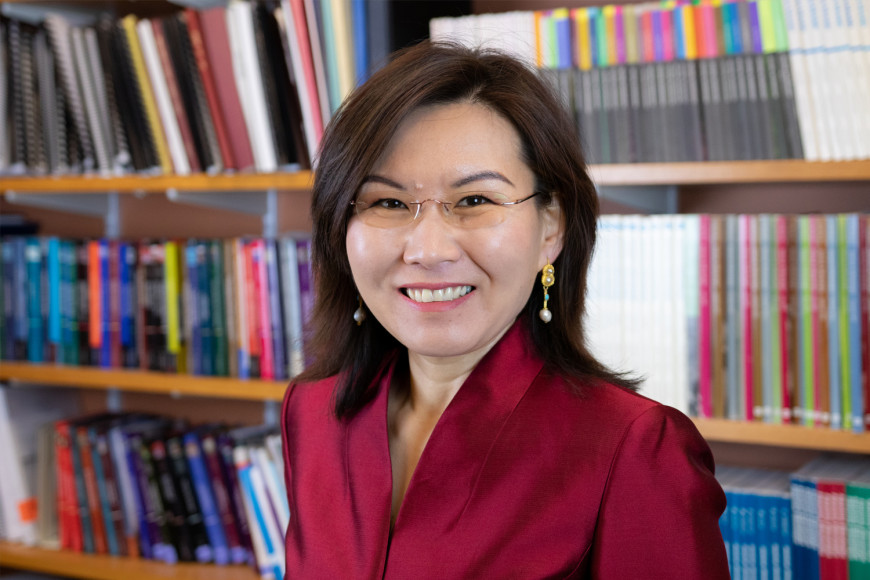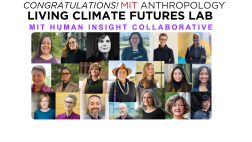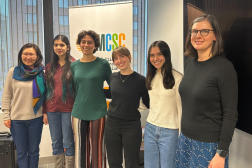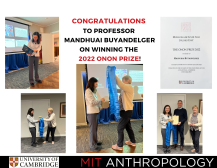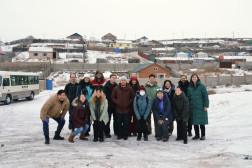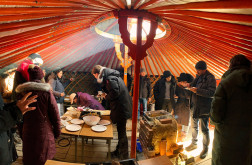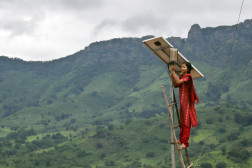Biography
Manduhai Buyandelger is an anthropologist of religion, gender, and politics, with regional expertise in Mongolia. Her early work centered on cultural memory and religious practices among ethnic Buryats. She investigated the proliferation of shamanic practices during the first decade of postsocialism, examining how these activities contested both Soviet and Enlightenment-based values of secularism and rationality. Tragic Spirits: Shamanism, Gender, and Memory in Contemporary Mongolia (University of Chicago Press, 2013) won a 2014 Francis L.K. Hsu book prize from the Society of East Asian Anthropology and was shortlisted as one of the top five social science books on Asia by the International Convention of Asia Scholars (ICAS) in 2015. Her second book, A Thousand Steps to the Parliament: Constructing Electable Women in Mongolia (University of Chicago Press, 2022), turns to a wider national Mongolian stage, looking at electoral politics, with the particular aim of documenting and analyzing the fortunes and subjectivities of women who are running for parliamentary office. It won 2022 Mongolian Anthropology Association Best Book Prize, and Mongolian Writers Association 2023 Golden Quill Pen award for the best book in a category that addresses human rights issues.
For her forthcoming projects, Manduhai Buyandelger is turning attention to the world of human-nonhuman relations. Joining recent work on multispecies ethnography, Buyandelger aims to examine relations between humans and domesticated animals, such cats and dogs and what these relations might tell us about the politics of care and neglect as well as infrastructures of urban settings in Mongolia and in the US. By looking at immersive technologies such as the VR, she bridges the study of spiritual and technological, and experiential and speculative by examining virtual and other realities. She is also developing an Anthro-Engineering project with MIT Nuclear Engineering to explore alternative heating systems in Mongolia.
Manduhai Buyandelger’s essays appeared in American Ethnologist, Journal of Royal Anthropological Association, Inner Asia, and Annual Review of Anthropology.
Research
My research examines how people rebuild their lives, selves, and social worlds in the wake of dramatic political transformation. Most of my work has been in Mongolia, where the collapse of state socialism in 1990 and the subsequent shift to democracy and neoliberal capitalism opened new economic opportunities while also challenging citizens’ sensibilities about what constitutes a viable and meaningful existence. My first book explores how a nomadic ethnic group, in its attempt to survive life-threatening hardships in the aftermath of state collapse, has been reconstituting its previously suppressed religious practices. My second book examines the reconstruction of the new neoliberal state through parliamentary elections and their attendant political campaigns, taking a close eye to how women have struggled to gain political office. In both projects, I trace shifts in the social roles and subjective experiences of women and men under postsocialism, especially examining how people create new senses of self and value. I intervene in anthropological discussions on religion, state, subjectivities, and gender from a post-socialist perspective.
In my forthcoming research I bridge the study of spiritual and technological, and experiential and speculative by examining virtual and other realities.
Selected Publications
Books
A Thousand Steps to the Parliament: Constructing Electable Women in Mongolia (University of Chicago Press, 2022)
Tragic Spirits: Shamanism, Gender, and Memory in Contemporary Mongolia (University of Chicago Press, 2013)
Articles
| 2018 | Asocial memories, 'poisonous knowledge', and haunting in Mongolia. Journal of the Royal Anthropological Institute. 25, 66-82. |
| 2013 | Review of “Not Quite Shamans: Spirit Worlds and Political Lives in Northern Mongolia by Morten Axel Pedersen. Ithaca, NY: Cornell University Press, 2011. 250 pp." American Anthropologist Vol. 115, No. 1, pp. 150-151. |
| 2009 | Mongolian Shamanism: The Mosaic of Performed Memory In Genghis Khan and the Mongol Empire. Fitzhugh and all eds., Smithsonian Institution |
| 2008 | Post-Post-Transition Theories: Walking on Multiple Paths. Annual Review of Anthropology. 37:235-50. 2007 |
| 2007 | Dealing with uncertainty: Shamans, marginal capitalism, and the remaking of history in postsocialist Mongolia. In American Ethnologist Vol. 34, No. 1, pp. 127-147 |
Teaching
21A.01
How Culture Works
Introduces diverse meanings and uses of the concept of culture with historical and contemporary examples from scholarship and popular media around the globe. Includes first-hand observations, synthesized histories and ethnographies, quantitative representations, and visual and fictionalized accounts of human experiences. Students conduct empirical research on cultural differences through the systematic observation of human interaction, employ methods of interpretative analysis, and practice convincing others of the accuracy of their findings.
21A.104
Memory, Culture, and Forgetting
Introduces scholarly debates about the sociocultural practices through which individuals and societies create, sustain, recall, and erase memories. Emphasis is given to the history of knowledge, construction of memory, the role of authorities in shaping memory, and how societies decide on whose versions of memory are more "truthful" and "real." Other topics include how memory works in the human brain, memory and trauma, amnesia, memory practices in the sciences, false memory, sites of memory, and the commodification of memory. Students taking graduate version complete additional assignments.
21A.141J / WGS.274J
Images of Asian Women: Dragon Ladies and Lotus Blossoms
Explores some of the forces and mechanisms through which stereotypes are built and perpetuated. In particular, examines stereotypes associated with Asian women in colonial, nationalist, state-authoritarian, and global/diasporic narratives about gender and power. Students read ethnography, fiction, and history, and view films to examine the politics and circumstances that create and perpetuate the representation of Asian women as dragon ladies, lotus blossoms, despotic tyrants, desexualized servants, and docile subordinates. Students are introduced to debates about Orientalism, gender, and power.
21A.157
The Meaning of Life
Examines how a variety of cultural traditions propose answers to the question of how to live a meaningful life. Considers the meaning of life, not as a philosophical abstraction, but as a question that individuals grapple with in their daily lives, facing difficult decisions between meeting and defying cultural expectations. Provides tools for thinking about moral decisions as social and historical practices, and permits students to compare and contextualize the ways people in different times and places approach fundamental ethical concerns.
21A.529
Virtual and Other Realities
Explores virtual worlds created in cyberspace, non-internet ritual spaces, science laboratories, tech companies, and artistic performances from an anthropological perspective. Students acquire analytical tools for thinking about immersive experiences of being someone else, and the socio-economic, political, and technological contexts behind creating specific types of parallel worlds. Examines and contextualizes the ways in which scientists, designers, shamans, ritual specialists, and corporations imagine, respond to, and steer people's desires and needs. Considers debates on the future of imagination, sensory experiences, and creativity in technology. Limited to 20. This class is designed as a seminar class for graduate and advanced undergraduate students.
21A.S01
Anthro-Engineering Decarbonization at the Million-Person Scale
Explores and experiments with pathways of decarbonization at the million-person scale through an interdisciplinary “anthro-engineering” approach. By putting people first, we examine how user-centric design, holistic ally and stakeholder inclusion, responding to cultural and political constraints on clean energy issues, and working in and with diverse groups on open-ended problems can create impactful and equitable changes in energy systems. Students engage with anthropological approaches to energy, development, sustainability, and climate-related issues while simultaneously exploring the possibilities for practical, real-world intervention into an energy landscape dominated by fossil fuels.
Awards
| 2023 | Mongolian Writers Association 2023 Golden Quill Pen award for the best book in a category of best books addressing human rights issues. Ulaanbaatar, Mongolia for A Thousand Steps to Parliament: Constructing Electable Women in Mongolia |
| 2023 | The Onon Prize 2022 For contribution to Inner Asian Studies. University of Cambridge, UK. Mongolia and Inner Asia Studies Unit |
| 2022 | Mongolian Anthropology Association 2022 Best Book Prize for A Thousand Steps to Parliament: Constructing Electable Women in Mongolia. Ulaanbaatar, Mongolia. |
| 2022 | MIT Climate and Sustainability Consortium Seed Awards 2022-2024 |
| 2015 | Shortlists ICAS Book Prize 2015, International Convention of Asia Scholars, for Tragic Spirits |
| 2014 | Hsu Book Prize, Society for East Asian Anthropology, for Tragic Spirits |
| 2013 | James A. and Ruth Levitan Prize in the Humanities, MIT School of Humanities, Arts, and Social Sciences |
| 2012 | MIT SHASS Research Fund |
| 2008 | National Science Foundation (Gender and Technologies of Election in Mongolia) |
| 2008 | Wenner-Gren Foundation Post-doctoral Grant |
News
Living Climate Futures Lab awarded inaugural MITHIC Faculty-Driven Initiative Seed Grant
MITHIC Staff
May 21, 2025
3 Questions: Bridging anthropology and engineering for clean energy in Mongolia
Leda Zimmerman | School of Humanities, Arts, and Social Sciences | MIT News
October 2, 2024
Anthro-Engineering in Ulaanbaatar: MIT NEET Article | Powering the Future
Story by Jiyoo Jye, Head of Communications | NEET, MIT
May 22, 2023
Manduhai Buyandelger among inaugural MCSC Seed Award Recipients
Molly Chase | Climate and Sustainability Consortium | MIT News
May 23, 2022
Keeping humanity central to solving climate change
Kelley Travers | MIT Energy Initiative Publication Date: April 22, 2021 | Photo: Abbie Trayler-Smith/Panos Pictures
April 26, 2021
Links
The Oral History of Twentieth Century Mongolia website
The surprising story of Mongolian shamanism
Anthropologist Manduhai Buyandelger wins the 2013 Levitan Prize in the Humanities
